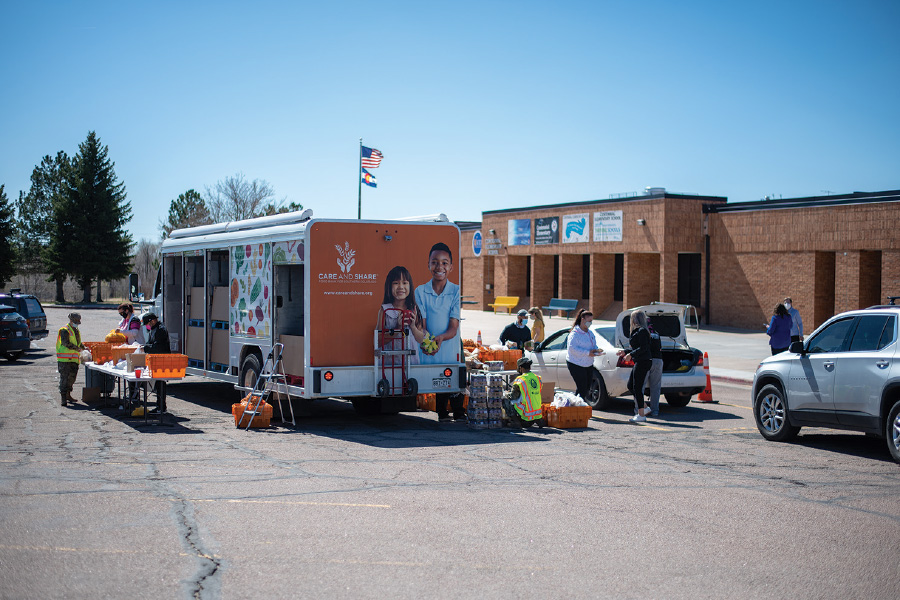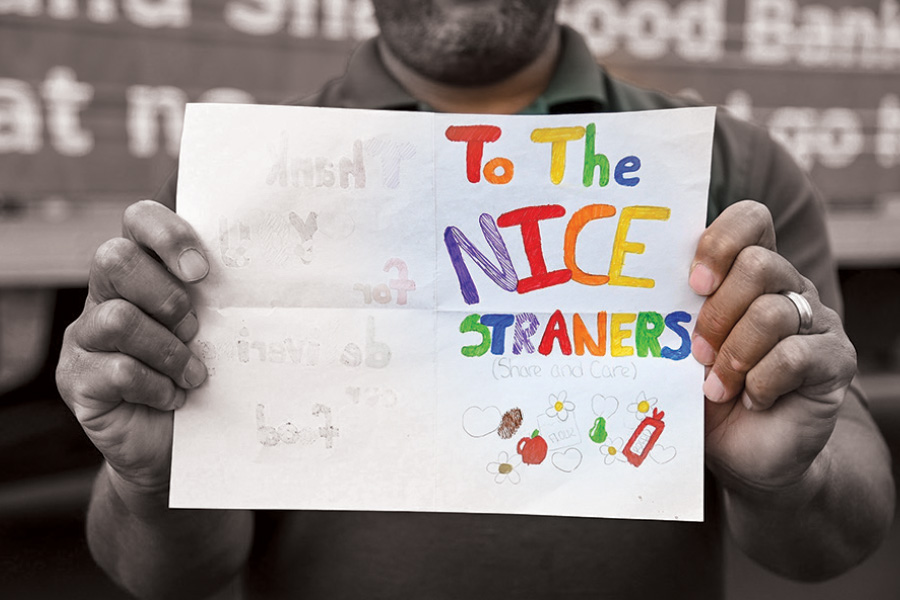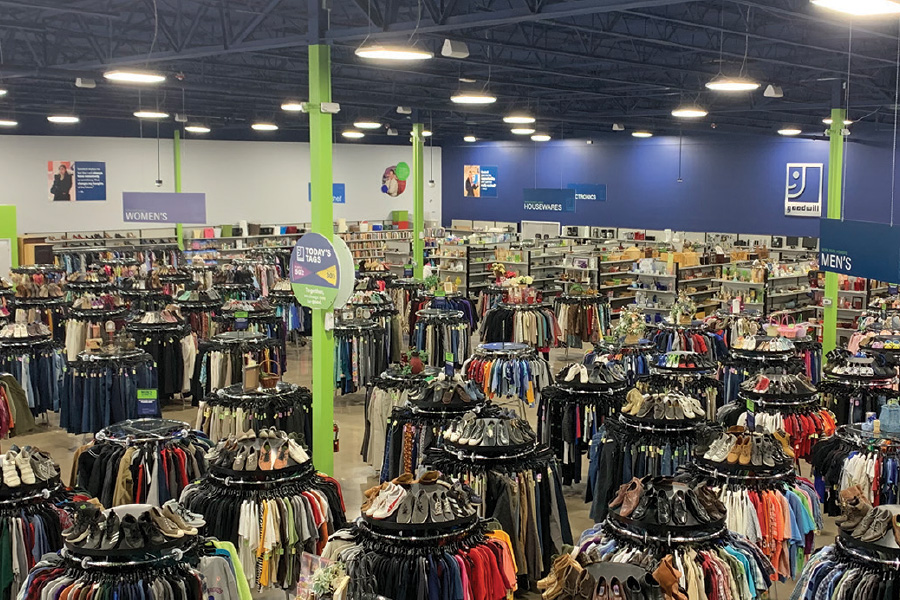Doing Good
This time of year often means a focus on giving to those less fortunate. Here, we highlight two organizations making a huge difference locally all year round.
18.3 Million Meals Distributed to Neighbors in Need
Sister Dominique Pisciotta founded the Care and Share Food Bank for Southern Colorado in 1972. In the early days, the nonprofit organization distributed food baskets throughout Colorado Springs. Now, almost 50 years later, Care and Share provides 21.9 million pounds of food, serving 220,755 neighbors in need throughout southern Colorado.
We have all heard the term “food insecurity,” and according to Feeding America, in early 2020, food insecurity was more prevalent than it had been in more than 20 years. The organization partners with more than 200 food banks across the nation, including Care and Share. It estimates that one in eight adults and one in six children will go hungry this year in El Paso County.
“About a year and a half ago, at the beginning of the pandemic, we ramped up our effort to make sure we could serve those in the community who were so deeply impacted. We saw people reaching out to the food bank and our mobile food pantries for help for the first time,” says Joanna Wise, marketing and communications director at Care and Share.

The mobile food pantries, Wise says, “offer direct distribution, where we go out with a semitruck full of really good food, including fruits, vegetables, meat, and dairy, and start delivering to those in need.” The organization gathers and sorts food garnered from multiple sources, distributing to nearly 300 partners across 31 counties.
Care and Share also partners with meal sites that include soup kitchens, food pantries, community centers, shelters, churches, and schools. This outreach sometimes includes providing lunch to more than 600 people a day or even serving families once a month at a local church. “During the pandemic, people lined up in their cars to pick up much-needed food,” says Wise. “We also deliver food for pickup to Boys & Girls Clubs and YMCAs, among others. We act as the food vendor to make sure it is delivered in a timely manner to all who need it.”
Care and Share sources thousands of tons of food by reaching out to food donors as a member of Feeding America. “We cut the state in half, so our area reaches from Monument down to the New Mexico border and the western and eastern slopes,” says Wise. “Being a member of Feeding America gives us great relationships with retailers, grocery stores, and such food manufacturers as General Mills and Coca Cola.”

The main distribution center is in the Springs with a secondary site in Pueblo. But the heart of the organization is Care and Share’s 4,400 volunteers who sort and pack the food, making it ready to distribute throughout the area to their partners and neighborhoods.
“During the last 18 months, we have seen a much greater need for food assistance but have also seen an improvement since the beginning of the pandemic. However, in more rural communities, we have seen more need and food insecurity,” says Wise. “We are here to help them out, so these communities don’t have to choose between paying rent and buying their medicine or putting food on their table.”
Creating Possibilities
Founded in 1902, Goodwill Industries International is a nonprofit organization, and the sale of gently used clothing and home goods in thrift stores nationwide goes toward community programs such as job training, placement services, and classes for people who have disabilities or are otherwise challenged in finding traditional employment. Under the umbrella of the worldwide organization, there are 180 different statewide organizations with one common denominator: the thrift stores and donation centers.
Fifteen years into Goodwill’s existence, Melissa Briggs founded the Denver chapter, the first in Colorado, and she was often seen around the then cow town riding her bicycle and collecting donations and discarded items. These items were then cleaned, repaired, and given to people in need.
More than a century later, Briggs’ spirit of helping others is present throughout the Goodwill community. The organization’s donors, shoppers, program participants, and employees embody Goodwill’s mission: helping individuals achieve greater independence. There are now many donation centers and thrift stores all across the Front Range, including Colorado Springs, Woodland Park, and Castle Rock.

Although most people know Goodwill for the thrift stores and donation centers, the organization is so much more than that. “We like to refer to our centers as opportunity centers,” says Bradd Hafer, marketing and communication manager, who has been with the organization for 10 years. “They fund our service and mission of helping people reach their highest level of personal and economic independence. That looks different to every individual.”
He adds, “Many of the people we serve have significant cognitive or developmental challenges, and each day, they start from scratch, having to relearn activities. We need to support them to be able to live as independently and actively as possible in their community.” The people that Goodwill supports have a wide variety of challenges from disabilities, economic issues, being unemployed or underemployed, individuals who have barriers to employment or simply limited work experience.
The Possibilities program was launched in 2012 at the 14,000-square-foot Garden of the Gods Campus. It houses Teaching Town, a school that offers real-world experiences to individuals who have developmental challenges. “These individuals have autism, traumatic brain injury, severe seizure disorders, cerebral palsy, and other cognitive disabilities,” says Hafer. “The students are taught life skills in interactive settings, including an apartment setting where they learn how to prepare their own food and pick up after themselves. We also have a store setting where they can learn how to choose their food and clothing. There is an art center, which is really important to their own growing development as this is a way to communicate.”
The students are then taken out into their community to use these skills, and Goodwill of Colorado has a number of job skills programs as well. In 2008, it started an IT training program that may include working on a help desk and even in cybersecurity. This career development program partners with statewide human services and other partnering agencies to help job seekers find appropriate and fulfilling jobs in Colorado. The program offers wide-ranging support to equip individuals who are underemployed or unemployed to succeed in their job pursuits and in life.
As Goodwill’s outreach continues to grow throughout Colorado, their programs for a better life have expanded exponentially as well. In partnership with the U.S. Department of Agriculture and Colorado State University Extension Services, Goodwill’s AgriAbility program helps farmers and ranchers with health, developmental, and aging challenges to continue working and contributing to our economy. Voyages is a day program for seniors, providing a safe, caring, and engaging environment for the elderly who need regular daytime supervision but also want to maintain their independence and active lifestyle. And Goodwheels is a community transportation service started to help mobility-challenged people.
“Goodwill also hires people within the organization to work in the retail stores and at donation center operations,” says Hafer. “Most of the 3,000 people we employ in the state of Colorado learn better job skills so that they can work in anything from food services to military installations. We try to help them along the way to keep them successful in the long run.”





